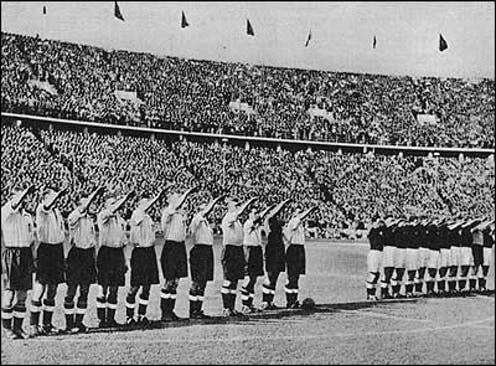England's football team has played 1,000 games – here's the most notorious

The date was May 14, 1938, and an estimated crowd of 110,000 football fans had gathered at the Olympic Stadium in Berlin to watch Germany face England in an end-of-season friendly.
But this was no ordinary football match. Flags marked with swastikas fluttered in the afternoon breeze above the stadium and as the sound of the German national anthem reverberated across the pitch, the German team instantaneously raised their right arms to perform a Nazi salute.
The England players, to thunderous applause from the capacity crowd, followed suit and imitated their German counterparts.
Following the conclusion of the 1937/38 season, the Football Association (FA) had arranged for the England national team to participate in a series of friendly fixtures against teams from across Europe. The end of season tour would see the side travel to Germany, France and Switzerland, with return fixtures due to be scheduled over the following two years.
But the arrangements were set at a time when war in Europe appeared almost inevitable. Germany, under the rule of Adolf Hitler and the Nazi party, had emerged as a genuine threat to peace on the continent having invaded Austria just two months prior to the England team travelling to Berlin. The FA had little interest in foreign policy and the British government only learnt that the match at the Olympic Stadium had been arranged ten days before it was due to take place.
Neville Chamberlain, who had become the British prime minister the previous year, had adopted a policy of appeasement and nonintervention in response to the threat posed by Nazi Germany in an attempt to avoid war. Due to the immediacy of the match and the tentative political situation, the British foreign office determined that to cancel the fixture would only result in Anglo-German relations being damaged.
Despite this, there was recognition that the match represented much more than just a game of football. The foreign office sent a letter to the FA reminding them of the broader political implications of the game and stated that “it is really important for our prestige that the British team should put up a really first-class performance”.
‘The dressing room erupted…’
Ultimately, there was little need to be concerned about the England performance – the team comprehensively beat the German side by six goals to three – but subsequent reports of the game have focused on the Nazi salute performed by both teams prior to kick off.
The night before the match, officials from the FA and the British foreign office agreed that it would be prudent for the England players to perform the salute. Although Hitler did not attend the game, other key figures from the Nazi party, including Joseph Goebbels, would be present. It was suggested that performing the salute would aid the diplomatic situation while also ensuring a positive reaction from the crowd.
The players themselves were only informed of the decision in the changing room less than an hour before the game and there have been contrasting accounts regarding their willingness to comply.
Stanley Rous, the FA secretary, later wrote that the players had no objections to performing the Nazi salute while other sources claim that the team “did not feel strongly about it”. The symbol and Nazi ideology, although already frowned upon by many, had yet to gather the significance and implication that it now has from a modern perspective.
But subsequent memoirs written by players who participated in the game have presented a very different version of events. Stanley Matthews later recalled that “the dressing room erupted … all the England players were livid and totally opposed to this” and that he felt shame whenever he saw “that infamous picture”.
The image of an England team lining up and performing a Nazi salute remains one of the most evident examples of how sport and politics intertwine. It is also one of the most unsettling moments in the history of the English national team.
This article is republished from The Conversation under a Creative Commons license. Read the original article.

Martyn Dean Cooke does not work for, consult, own shares in or receive funding from any company or organisation that would benefit from this article, and has disclosed no relevant affiliations beyond their academic appointment.

 Yahoo News
Yahoo News 

